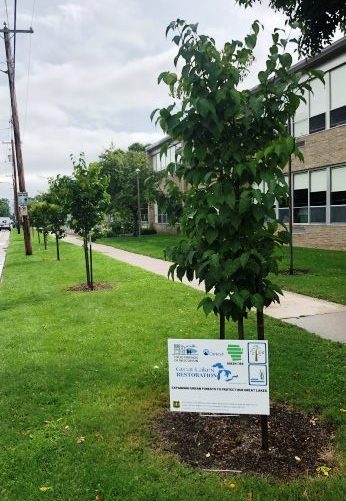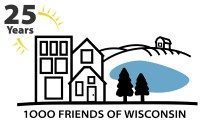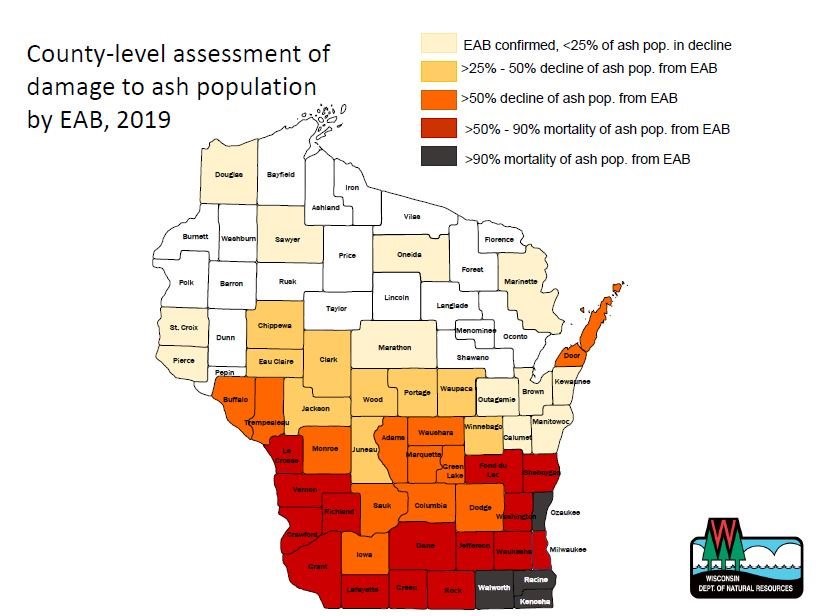Urban Forestry
1000 Friends of Wisconsin advocates for and helps expand urban and community forests around Wisconsin.
Urban forestry provides Wisconsin communities a number of benefits including the use of street trees as tools for creating more climate resilient communities. We work with partners at the community and state level to ensure the benefits of urban forests reach all Wisconsinites.
 Street Tree Benefits include:
Street Tree Benefits include:
- Stormwater runoff impacts:
- Reduce total amount of runoff
- Slow runoff infiltration into the ground, which can reduce local flooding
- Filter pollutants that would otherwise end up in our groundwater
- Sequester CO2 and remove other air pollutants from the atmosphere (watch how and why trees clean our air)
- Reduce energy demands (when trees are properly planted)
- Mitigate the urban heat island effect
- Provide traffic calming
- Increase urban wildlife habitat, including providing stopover habitat for migrating birds
- Raise property values
- Mental and physical health benefits
Taking Action
Leafing Out: A Webinar Series to Inspire Care for Trees
In 2021, 1000 Friends hosted a free webinar series open to the public that included presentations from urban forestry experts who shared stories and useful facts to educate people about everything related to trees and to inspire people to take action to protect trees in their yards and communities. See the Webinar Series page for information about the project and webinar recordings.
The Leafing Out webinar series was funded in part by an urban forestry grant from the State of Wisconsin Department of Natural Resources Forestry Program as authorized under s. 23.097, Wis. Stat.
Community Level
- Consider Re-writing your Community’s Tree Ordinance
- Onalaska rewrote theirs with a DNR grant
- Or identify stand-alone ordinances that benefit street trees.
- Become a Tree City USA
- The Tree City USA program is a nationwide movement that provides the framework necessary for communities to manage and expand their public trees.
- Participate in Wisconsin DNR’s Community Tree Management Institute (CTMI)
- The CTMI is a training program to educate municipal staff with limited urban forestry experience who are responsible for tree care and management in their community on community forestry program best practices.
State Level
1000 Friends’ former Community Project Coordinator Abe Lenoch was a member of the Wisconsin Urban Forestry Council. We support the following recommendations made by the Council:
- Advocate for urban forestry grants program funding to remain at current level or for it to be raised
- Allow invasive insect and disease control to qualify for catastrophic event grant dollars under the Wisconsin DNR Urban Forestry grant program
- Allow tree canopy to be used as credits for municipal MS4 permits
Working with Communities
1000 Friends partnered with Green Tier Legacy Communities (GLTC) and the Wisconsin DNR Urban Forestry program to add 350 street trees to urban forests in four Wisconsin communities.
We regularly seek similar funding opportunities to increase urban and community forest canopy across the state.
Emerald Ash Borer (EAB)
Since 2008, Wisconsin has seen a harsh decline in ash trees due to the Emerald Ash Borer. The impact of EAB has been especially detrimental because of the ubiquity of ash trees in Wisconsin communities. They are the second most common genus planted behind maple. See the Wisconsin DNR EAB mortality map by county below.
As EAB continues to reduce urban forest canopy in Wisconsin, 1000 Friends worked with communities to replant a diversity of street tree species to replenish the affected urban landscape.

